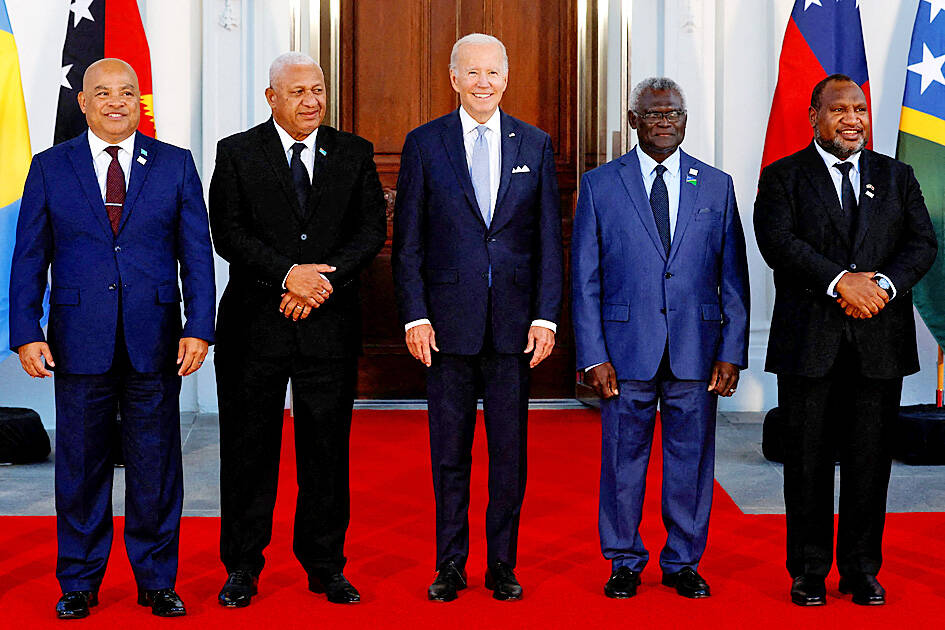Papua New Guinea (PNG) said it would sign a defense agreement with the US, ahead of a deal with Australia and despite opposition party concerns that it could upset China, because the Ukraine conflict shows the need for military capability.
Today, the Pacific island nation is to host visits by US Secretary of State Antony Blinken, Indian Prime Minister Narendra Modi, New Zealand Prime Minister Chris Hipkins and other Pacific island leaders.
While Modi’s visit is expected to focus on trade, Blinken is to sign a defense cooperation agreement (DCA) with PNG Prime Minister James Marape, the two nations have said.

Photo: Reuters
The agreement would boost PNG’s defense infrastructure and capability after decades of neglect, a government statement said on Saturday.
Highlighting domestic political sensitivity over taking sides in strategic competition between the US and China, the statement said the deal would “not stop Papua New Guinea from working with other nations including China.”
The defense agreement would also not give visiting US military personnel immunity for criminal conduct, the statement said.
“Assets developed under DCA will be owned by PNG Government,” it added.
The DCA is about building defense capabilities because border disputes are “inevitable in the future,” it said.
“Papua New Guinea does not have enemies, but it pays to be prepared,” it said, citing Russia’s invasion of Ukraine.
China, a major infrastructure provider to the Pacific islands, has sought to increase its security role, signing a security pact with the Solomon Islands that prompted criticism from the US and its allies about Beijing’s intentions.
While in PNG, Blinken and Palauan President Surangel Whipps Jr are today to sign a strategic agreement, before the US state secretary heads to Micronesia to sign a similar deal tomorrow, US Special Presidential Envoy for Compact Negotiations Joseph Yun said.
Yun said he hopes to conclude a deal with the Marshall Islands soon.
“We have made progress over my three-day visit to Marshall Islands and we hope to sign an agreement with the Marshall Islands in the coming weeks,” he said.
Washington reached what are known as Compact of Free Association (COFA) accords with the three island states in the 1980s, under which it retains responsibility for their defense and provides economic assistance while gaining exclusive access to huge strategic swathes of the Pacific in return.
Renewing them has become a key part of US efforts to push back against China’s bid to expand its influence in the region. Chinese diplomats have been courting the region and China’s construction and mining companies have expanded their business in many Pacific island nations.
The Marshall Islands’ COFA is due to expire this year. Yun gave no reason for the holdup in renewing it, but a parliamentary election is expected there in November.
Yun called the deals “strategically important.”
“We’ve achieved two out of three,” he said. “Compacts are very important for the United States. It defines the relationship between us and northern half of the Pacific.”

ACTION PLAN: Taiwan would expand procurement from the US and encourage more companies to invest in the US to deepen bilateral cooperation, Lai said The government would not impose reciprocal tariffs in retaliation against US levies, President William Lai (賴清德) said yesterday, as he announced five strategies to address the issue, including pledging to increase Taiwanese companies’ investments in the US. Lai has in the past few days met with administrative and national security officials, as well as representatives from various industries, to explore countermeasures after US President Donald Trump on Wednesday last week announced a 32 percent duty on Taiwanese imports. In a video released yesterday evening, Lai said that Taiwan would not retaliate against the US with higher tariffs and Taiwanese companies’ commitments to

Intelligence agents have recorded 510,000 instances of “controversial information” being spread online by the Chinese Communist Party (CCP) so far this year, the National Security Bureau (NSB) said in a report yesterday, as it warned of artificial intelligence (AI) being employed to generate destabilizing misinformation. The bureau submitted a written report to the Legislative Yuan in preparation for National Security Bureau Director-General Tsai Ming-yen’s (蔡明彥) appearance before the Foreign Affairs and National Defense Committee today. The CCP has been using cognitive warfare to divide Taiwanese society by commenting on controversial issues such as Taiwan Semiconductor Manufacturing Co’s (TSMC, 台積電) investments in the

‘SPECIAL CHANNEL’: Taipei’s most important tasks are to stabilize industries affected by Trump’s trade tariffs and keep negotiations with Washington open, a source said National Security Council Secretary-General Joseph Wu (吳釗燮) arrived in the US for talks with US President Donald Trump’s administration, a source familiar with the matter said on Friday. Wu was leading a delegation for a meeting known as the “special channel,” the Financial Times reported earlier. It marked Trump’s first use of the channel since returning to the White House on Jan. 20. Citing a source familiar with the matter, the Financial Times reported that Minister of Foreign Affairs Lin Chia-lung (林佳龍) was also a part of the delegation. The visit came days after China concluded war games around Taiwan and amid Trump’s

HELPING HAND: The steering committee of the National Stabilization Fund is expected to hold a meeting to discuss how and when to utilize the fund to help buffer the sell-off The TAIEX plunged 2,065.87 points, or 9.7 percent, to close at 19,232.35 yesterday, the highest single-day percentage loss on record, as investors braced for US President Donald Trump’s tariffs after an extended holiday weekend. Amid the pessimistic atmosphere, 945 listed companies led by large-cap stocks — including Taiwan Semiconductor Manufacturing Co (TSMC, 台積電), Hon Hai Precision Industry Co (鴻海精密) and Largan Precision Co (大立光) — fell by the daily maximum of 10 percent at the close, Taiwan Stock Exchange data showed. The number of listed companies ending limit-down set a new record, the exchange said. The TAIEX plunged by daily maxiumu in just